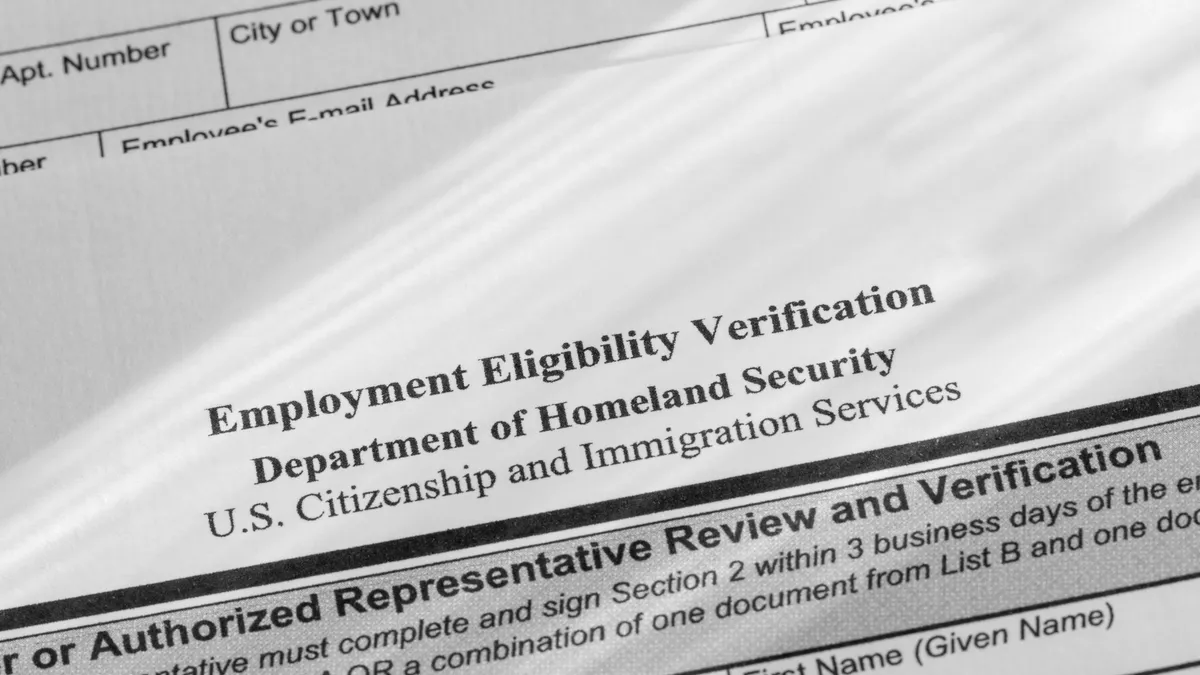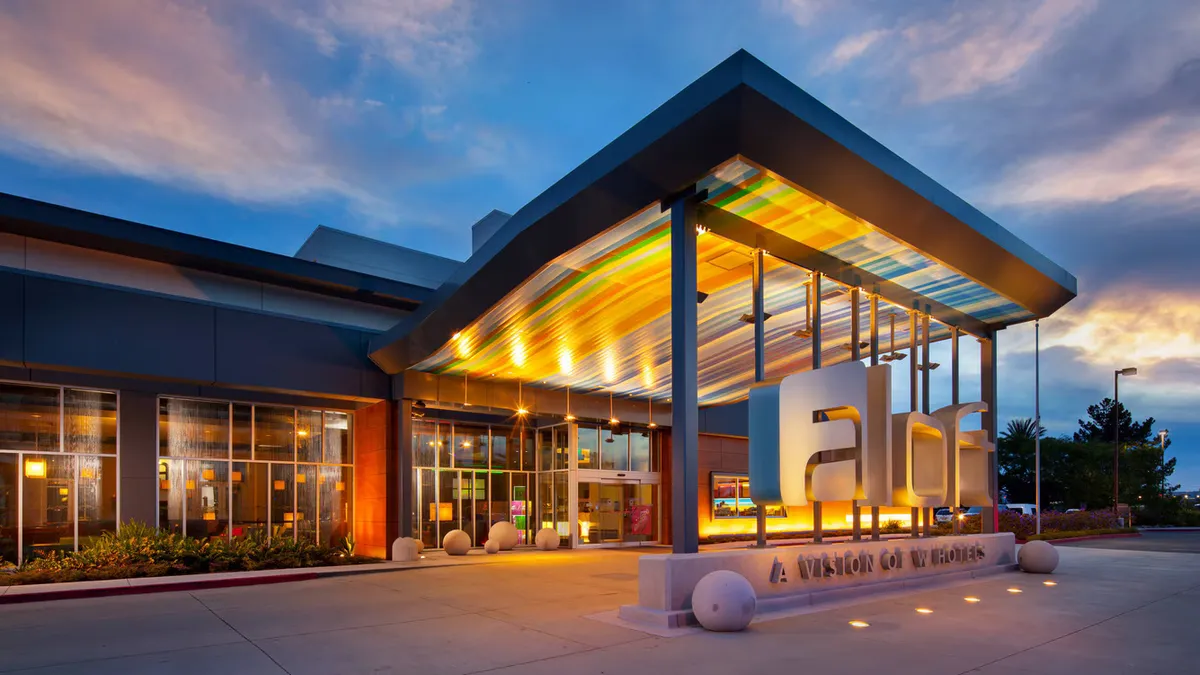As 2025 gets underway, hospitality industry leaders are evaluating how to adapt their hotels to a changing world.
The economy, and the hotel construction financing environment, is different now than it was one year ago. This year’s travelers are evolving, too. Growing numbers of luxury hotel guests are seeking cutting-edge health and wellness offerings, and families are hitting the road with multiple generations in tow.
Hotels are working harder to provide the culturally immersive experiences their guests expect, as well as accommodate healthy numbers of group travelers. Meanwhile, renovations are dominating the hotel construction pipeline.
Hotel Dive spoke to leaders in the hospitality industry about their 2025 hotel industry forecasts. The hospitality trends they shared will impact hotel operations, hospitality technology, amenities and more.
Hotel investment activity reaches new highs
In 2025, hospitality professionals can expect hotel investment to ramp up amid a cooling interest rate environment, improving lender sentiment and healthy travel levels.
Rate cuts in the fourth quarter of 2024 have “been really positive so far” for hotel investment, Greg Perry, vice president of hospitality investments at RREAF Holdings, told Hotel Dive. Additional rate cuts are anticipated in 2025, which could spur future hotel investment, Global Head of JLL Hotels Research Zach Demuth told Hotel Dive.
“If there’s a story for 2025, [it’s that] increasing group demand will be a key driver of our business [this] year.”

Greg Perry
vice president of hospitality investments at RREAF Holdings
Additionally, more lenders are becoming excited about the state of the market, so “accessible and more fairly priced capital is on the near-term horizon,” Perry said.
Strong group travel will also drive hotel investment in 2025, according to Perry.
“If there’s a story for 2025, [it’s that] increasing group demand will be a key driver of our business [this] year,” Perry said. With more corporate groups convening in cities, hotels in urban areas will be desirable to investors, Demuth noted.
“Urban markets will drive investment demand [this] year,” Demuth said. “Resorts were the darling child of the post-COVID era. Leisure demand was off the charts, and investors really wanted to capitalize. Leisure demand is still strong but softened quite a bit from where it was.
“On the flip side, urban markets are exceptionally strong. Places like New York City, Chicago, New Orleans, Nashville — leisure demand is still there, but what we’re really starting to see is the resurgence of group travel, corporate travel and also international travel.”
Perry agreed that urban markets will see strong investor demand this year, but noted that secondary suburban markets “are going to be the real winners going forward,” as the extended stay category remains the “darling” of the industry in 2025.
As for deal size, Demuth said there’s been a “tremendous” amount of investor interest for high-quality, irreplaceable assets valued at over $250 million. He pointed to the $725 million sale of Hawaii’s Turtle Bay Resort, the $400 million sale of W South Beach in Miami and the $1 billion sale of Hyatt Regency Orlando. There’s also been significant interest for properties on the other end of the spectrum in the “extended stay, lower-tier select-service, sub-$25 million range,” Demuth said.
“Our anticipation for [this] year is that we'll actually start reverting more to the mean, and that we’ll see more of these middle transactions. While they might not be as sexy as these $500 million deals, that's what the industry really needs.”

Zach Demuth
global head of JLL Hotels Research
In 2025, there will be more mid-sized deals valued between $50 million and $150 million — “your typical full-service brand hotels,” according to Demuth.
“Our anticipation for [this] year is that we'll actually start reverting more to the mean, and that we’ll see more of these middle transactions,” Demuth said. “While they might not be as sexy as these $500 million deals, that's what the industry really needs.”
Hotel investors will gravitate toward newer hotels under Marriott, Hilton and Hyatt brands, Perry noted. “There’s still this flight to quality that we saw starting in the pandemic era,” he said.
The “institutional quality of new brands” will “attract the next big group of capital to come into the industry,” Perry added, noting that hotels in upper-tier segments will be particularly desirable.
A still-high inflationary environment this year won’t halt transaction activity for the hotel industry, Perry forecasted. “Being in an industry like hotels, which have dynamic daily pricing that can move with inflation, can only help portfolios.”
Evolving group travel is a top opportunity for hotels
Group travel is predicted to lead other travel sectors and be a revenue driver for hotels in 2025.
Groups will continue to travel for corporate meetings, which have been the “bread and butter” of the meetings and events industry, Jessica Carey, vice president of customer operations at Cendyn, told Hotel Dive. However, in 2025, more groups will also travel for entertainment and sporting events.
Hotels will be able to capture recurring event space bookings by working with local performing acts to do “intimate concerts and showcases that fill unused space reliably,” Carey said.
Additionally, sports tourism — the “surprising winner of 2024” — will continue to flourish in 2025 across all levels of youth and professional sports, Carey noted.
Frank Passanante, senior vice president and global head of sales at Hilton, echoed a similar sentiment. “Sports travel is surging,” he told Hotel Dive, adding that Hilton’s worldwide sports sales revenue tripled in volume from 2019 to 2024, 80% of which stemmed from youth or amateur sports.
During a third-quarter 2024 earnings call, MGM Resorts CEO Bill Hornbuckle said sports tourism will be a big opportunity for Las Vegas hotels, specifically, in the near future.
Both Carey and Passanante noted that convention business will remain strong this year, with Carey highlighting the “long lead times” of conferences and association events.
“Group travel should be a core component of hotels’ strategies in 2025. It’s a reliable way to bring business into your hotel, especially during times of the year and parts of the week where transient business isn’t as strong. Hotels with proactive approaches to selling are winning in today’s competitive market.”

Jessica Carey
vice president of customer operations at Cendyn
Groups will increasingly visit secondary markets for both corporate and entertainment purposes, according to Carey. She said associations, particularly, have been to the big cities — naming New York, Los Angeles and Nashville — and now they’re looking at markets like St. Louis and Memphis, Tennessee.
The associations are “looking for more of these niche secondary markets or smaller primary markets that they can go to that have some really interesting cultural events alongside them,” Carey said. She noted that more people will tack on days to business trips to enjoy business travel destinations, even if they are smaller, staycation-type places.
Passanante also pointed to the continuation of “bleisure” travel in 2025.
“We have seen the impact of remote and hybrid work on changing stay behaviors, with continued demand for longer stays to make the most out of each trip,” he said. “Blended leisure stays and ‘workcations’ are on the rise, as with the ability to work from anywhere, employees are taking their office on the road.”
To cater to the bleisure trend, many planners “are gravitating toward an all-in-one approach to maximize the attendee experience and ease of planning,” Passanante said.
Many planners, Carey noted, have higher budgets for 2025 than in years past, and they are looking for unique experiences or add-ons to make their events more memorable.
Hotels will need to provide unique experiences to capture group business, Carey said. Hotels should also consider that sustainability efforts and carbon footprint mindfulness, along with DEI initiatives and community service offerings, will matter most to planners this year, she added.
“Group travel should be a core component of hotels’ strategies in 2025,” Carey said. “It’s a reliable way to bring business into your hotel, especially during times of the year and parts of the week where transient business isn’t as strong. Hotels with proactive approaches to selling are winning in today’s competitive market.”
Medical science powers high-tech wellness amenities
The global wellness market is projected to reach $9 trillion by 2028, according to the Global Wellness Institute. While wellness offerings are nothing new at hotels, the types of experiences are changing — and they’re becoming more high-tech.
2025’s wellness amenities will go beyond the usual spa treatments to embrace scientific and technological innovation, experts told Hotel Dive.
“The future of hotel wellness is one where technology supports deeper relaxation, recovery and rejuvenation while enhancing the overall luxury experience,” Meghan Patke, founder and president of luxury travel public relations firm Modern Currency, told Hotel Dive.
According to Patke, that future will be driven by smart technologies and data analytics, as well as robotics and automation. She pointed to the rise of massage robots such as Aescape’s as an example.
“One of the major shifts we're seeing is toward experiences that seamlessly integrate scientific innovation with cutting-edge technology,” said Oxana Spivey, vice president of wellness standards at Wellness in Travel & Tourism, an organization that offers wellness certifications for hotels and resorts. “Travelers are seeking wellness treatments and tools that are not only effective but also grounded in science.”
Combining technology and medical science can result in treatments that promote longevity and athletic recovery. Patke said treatments she’s seen include everything from IV drip therapy to biomarker testing.
Luxury hotels are taking note. The Four Seasons Resort Maui at Wailea, in Hawaii, partnered with Next Health, a Los Angeles-based health optimization and longevity services center, to offer “regenerative services” such as IV drips of NAD+, a coenzyme that facilitates energy production in the body.
Meanwhile, Sam Nazarian’s SBE is underway on a longevity-focused resort brand that will offer services like preventative MRI and CT scans and advanced blood diagnostics.
Despite the rise of high-tech wellness offerings, Spivey said low-tech amenities will remain important, too. That includes something as simple as getting a good night’s sleep, which hotels across chain scales are working harder to offer as sleep tourism continues to grow in popularity.
“Authentic wellness is a deeply individual experience — often found in the simplicity of nature walks, mindful breathing and nourishing diets,” Spivey told Hotel Dive.
Families bring along multiple generations
The more, the merrier, seems to be the mantra for the growing number of families traveling with multiple generations.
According to Hilton’s 2025 Trends Report, some 37% of travelers say they “often” take vacations with their parents, and two in five invite extended family members on trips. The rise in multigenerational travel also coincides with the growing presence of Generation Alpha — kids aged 14 years or younger — at hotels, with some 56% of families telling Hilton that they choose hotels based on their kids’ club or youth programming.
“A multigenerational trip will necessarily entail a booking of multiple rooms, for multiple nights, with a strong uptake of F&B offerings and other services the hotel may offer. This is a hugely spend-heavy type of guest profile."

Alicia Zur-Szpiro
co-founder of Wanderland London
The multigenerational travel trend presents a major opportunity for hospitality providers, according to Alicia Zur-Szpiro, co-founder of kids’ hospitality consultancy Wanderland London.
“A multigenerational trip will necessarily entail a booking of multiple rooms, for multiple nights, with a strong uptake of F&B offerings and other services the hotel may offer,” Zur-Szpiro told Hotel Dive. “This is a hugely spend-heavy type of guest profile.
“With a few well-thought-out and designed additions for kids and teens, hotels can win these bookings, each of which are worth tens of thousands of dollars,” Zur-Szpiro added.
Kid-friendly hospitality could be a $175 billion opportunity for hotels globally, according to Wanderland’s Kids Hospitality Report released in November.
Some hotels and resorts have already jumped on the trend. Dart Interests’ Orlando, Florida-based Evermore resort was built in response to multigenerational travel “getting more and more popular” amid a “deterioration of connectedness,” executive vice president Stewart Brown told Hotel Dive in October.
Timeshares and vacation clubs, such as Holiday Inn Club Vacations and Marriott Vacations Worldwide, are also targeting multigenerational travelers with property expansions and family-friendly amenities.
Hotels offer culturally immersive experiences
2025’s travelers aren’t looking for cookie-cutter hotel experiences. Rather, they want to be immersed in the local culture of their destination — and hotels are helping them do so.
“Wherever [travelers] go, they're going there to experience whatever that local area has to offer,” Mike Metcalf, president of HQ Hotels, told Hotel Dive. “People certainly are much more interested in embracing a local community, and getting out and seeing what it is.
“When they're back at the hotel, that experience doesn't stop,” he added.
Local immersion and authenticity are driving cultural tourism, according to Euromonitor International, which found that growing numbers of “cultural explorers” are prioritizing travel experiences that offer immersion in local cultures (64%) and arts and heritage activities (46%).
One area where hotels can provide a local cultural experience is in the dining room. Restaurants and lounges are increasingly offering a sense of place, reflected both in their physical surroundings and menus, hospitality experts told Hotel Dive. It’s a trend that ramped up in 2024, as hotel restaurants emphasized local ingredients, according to Stephen Toevs, Marriott International’s senior director of culinary for the U.S. and Canada.
Cultural travel is especially important to younger travelers, with 50% of Gen Z travelers saying that being able to immerse themselves in a local culture is a top motivator for their trips, per a PMG report released in May.
Several hotel brands have adjusted their marketing strategies accordingly. In November, luxury hospitality brand Viceroy rebranded to emphasize, in part, its “curated experiences” intended to “immerse guests in the culture, adventure, and beauty of each unique destination.”
Cultural offerings have also played a role in InterContinental’s brand evolution, which will see the luxury brand’s hotels offer spaces in hotel lobbies that serve as “hubs for local cultural knowledge.”
Renovations dominate hotel construction pipelines
There will be an uptick in hotel renovations in 2025, with a large number of property improvement plans coming due this year.
Typically for a select-service hotel, an owner will complete a thorough renovation of the property every 15 to 20 years, Lodging Econometrics SVP Bruce Ford told Hotel Dive. Because there was a significant number of hotels built between 2004 and 2009, many hotels across the country are coming due for their first major renovation.
Some 5,283 hotels, representing 594,872 rooms, were built in the U.S. between 2004 and 2009, according to Lodging Econometrics data obtained by Hotel Dive. Roughly 48% of those hotels were built in 2008 and 2009 alone.
There will be between 300,000 and 400,000 hotel rooms renovated and converted in the U.S. in 2025, according to Ford, who noted that certain factors — like an increase in hotel transactions — could accelerate that prediction.
“Sales transactions nine times out of 10 lead to a renovation,” he said, noting later that “there’s certainly an uptick in hotels available for sale” after the Federal Reserve’s rate cuts in 2024, and they span chain scales.
At The Lodging Conference in October, Extended Stay America CEO Greg Juceam said “an increase in property improvement plans getting underway,” among other factors, will contribute to an “explosive time for the industry” in the years to come.
There were 722 renovation projects, representing 141,136 rooms, underway across the U.S. in the third quarter of 2024, according to Lodging Econometrics.
As for what hoteliers may be changing at their properties in 2025, Ford said “automation is a big part of the story in hotels.”
This will be reflected in mobile keys or apps that assist with the check-in process, Ford noted. Additionally, hotels will work to make rooms as efficient as possible. For example, hotel owners may opt for LED lighting or an energy-efficient heating and cooling system.
Hotel owners, though, could see longer wait times in 2025 and beyond for certain products and technology from overseas if President-elect Donald Trump’s proposed tariff policy impacts supply chains, Ford noted.



















